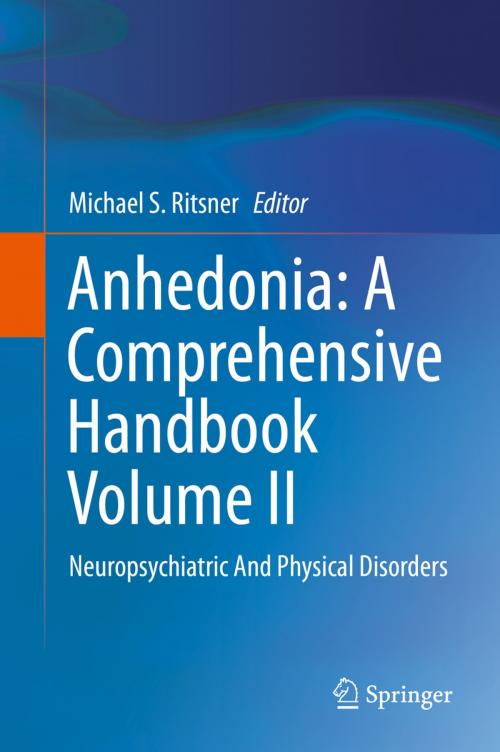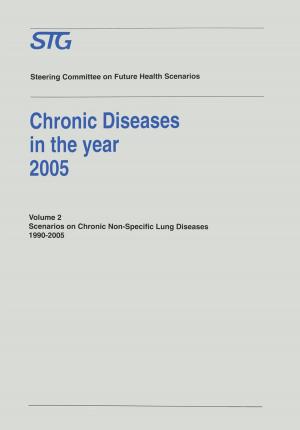Anhedonia: A Comprehensive Handbook Volume II
Neuropsychiatric And Physical Disorders
Nonfiction, Health & Well Being, Medical, Specialties, Psychiatry, Psychology, Clinical Psychology| Author: | ISBN: | 9789401786102 | |
| Publisher: | Springer Netherlands | Publication: | February 24, 2014 |
| Imprint: | Springer | Language: | English |
| Author: | |
| ISBN: | 9789401786102 |
| Publisher: | Springer Netherlands |
| Publication: | February 24, 2014 |
| Imprint: | Springer |
| Language: | English |
This is the first comprehensive two-volume collection on anhedonia, a disorder that played an important role in psychopathology theories at the beginning of the twentieth century. Anhedonia is a condition in which the capacity of pleasure is partially or completely lost, and it refers to both a personality trait, and a “state symptom” in various neuropsychiatric and physical disorders. It has a putative neural substrate, originating in the dopaminergic mesolimbic and mesocortical reward circuit. Over the past three decades cognitive psychology and behavioral neuroscience have expanded our understanding of anhedonia and other reward-related processes. The aim of this new two-volume collection on anhedonia is to highlight the contributions of eminent scientists in this field as well as to provide readers with comprehensive accounts of recent developments as perceived by the authors. This monograph is divided into five parts. Volume I contains parts one and two (Conceptual Issues and Neurobiological Advances) including 14 chapters that serve as an introduction and overview of conceptual issues. Volume II contains three parts (Anhedonia in Psychotic Disorders, Anhedonia in Mood and Personality Disorders, and Anhedonia in Neurological and Physical Disorders) including 15 chapters that provide an overview of the construct, measurement of anhedonia in schizophrenia spectrum disorders, hedonic capacity and related factors in schizophrenia and schizoaffective disorder, anhedonia as an indicator of genetic liability for schizophrenia, and as a trait marker for depression, the role of an anhedonia in trauma-related disorders, anorexia nervosa, stress-induced eating disorders, schizotypal traits and risk of suicide. This book will be of interest to a broad spectrum of readers including psychiatrists, psychologists, neurologists, neuroscientists, endocrinologists, pharmacologists, general practitioners, geriatricians, graduate students, and health care providers in the fields of mental health.
This is the first comprehensive two-volume collection on anhedonia, a disorder that played an important role in psychopathology theories at the beginning of the twentieth century. Anhedonia is a condition in which the capacity of pleasure is partially or completely lost, and it refers to both a personality trait, and a “state symptom” in various neuropsychiatric and physical disorders. It has a putative neural substrate, originating in the dopaminergic mesolimbic and mesocortical reward circuit. Over the past three decades cognitive psychology and behavioral neuroscience have expanded our understanding of anhedonia and other reward-related processes. The aim of this new two-volume collection on anhedonia is to highlight the contributions of eminent scientists in this field as well as to provide readers with comprehensive accounts of recent developments as perceived by the authors. This monograph is divided into five parts. Volume I contains parts one and two (Conceptual Issues and Neurobiological Advances) including 14 chapters that serve as an introduction and overview of conceptual issues. Volume II contains three parts (Anhedonia in Psychotic Disorders, Anhedonia in Mood and Personality Disorders, and Anhedonia in Neurological and Physical Disorders) including 15 chapters that provide an overview of the construct, measurement of anhedonia in schizophrenia spectrum disorders, hedonic capacity and related factors in schizophrenia and schizoaffective disorder, anhedonia as an indicator of genetic liability for schizophrenia, and as a trait marker for depression, the role of an anhedonia in trauma-related disorders, anorexia nervosa, stress-induced eating disorders, schizotypal traits and risk of suicide. This book will be of interest to a broad spectrum of readers including psychiatrists, psychologists, neurologists, neuroscientists, endocrinologists, pharmacologists, general practitioners, geriatricians, graduate students, and health care providers in the fields of mental health.















